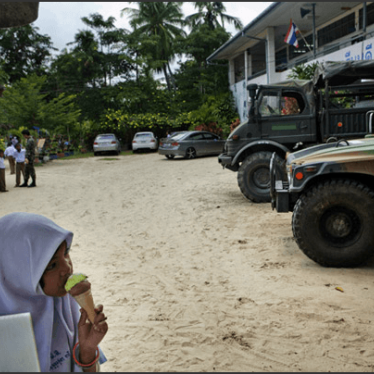Spain’s Foreign Minister Josep Borrell is scheduled to open an international conference tomorrow on protecting schools during wartime on the island of Mallorca, Spain. The occasion has me thinking about two schools at almost opposite ends of Europe, united by a common fate, yet separated by almost 80 years: Barcelona’s “School of the Sea” and “School Number 3” in Krasnohorivka, Ukraine.
School Number 3 sits in eastern Ukraine, almost on the front line dividing government-controlled territory and the parts of the country controlled by Russian-backed armed groups. In November 2015, I was shown around the school by its administrator, Tatiana Petrovna, who pointed out the damage caused by the civil war there. Classroom walls and hallways strewn with the pockmarks of weaponry fragmentation. A gaping hole in the school’s roof.
Petrovna told me that on the morning of June 3, 2015—the day after the end of the school term—heavy artillery fire came from the direction of non-government-held territory and continued for 13 hours. There were 12 direct hits on the school, while more craters marked the school grounds.
During the conflict in eastern Ukraine, both sides have used schools as bases. But local residents told me there were no soldiers in the school that day. There was a military checkpoint about 700 meters from the school that may have been a target, but the pattern of the shelling suggests that even if that was a target, the rebels were also targeting the school. If so, it could qualify as a war crime.
“If there are 12 shells falling one after another, it’s clearly not connected to the checkpoint, or it’s very bad aiming,” Petrovna said.
Barcelona’s School of the Sea used to sit near the city’s beach. The wooden building was opened in 1922 for children who might benefit from the health properties of the sea air. The school had a distinct philosophy, aimed at educating children to become responsible citizens committed to a better world and to service to society.
On the afternoon of January 7, 1938, during Spain’s Civil War, the Italian air force dropped a bomb that destroyed the school. That plane—part of the support from fascist Europe to Spain’s Nationalist faction—took off from Mallorca.
Attacks on schools sadly are not rare these days. Since 2013, there has been a pattern of attacks on schools in at least 26 countries, according to the Global Coalition to Protect Education from Attack. In at least 30 countries, schools have been used for military purposes, converted into military bases or barracks or used to store weapons or munitions.
The government representatives meeting in Mallorca are supporting a political agreement known as the Safe Schools Declaration, which was drafted under the leadership of Norway and Argentina in 2015. To date, 87 countries have joined, and it’s hoped that the conference will encourage even more to sign on. The declaration contains several common sense measures that countries can take to make it less likely that schools will be attacked, and to mitigate the consequences if attacks occur. These include a commitment to investigate all such attacks and prosecute the people responsible. It includes incorporating measures into military policies and training to discourage the use of schools for military purposes. And it includes ensuring that education continues for all children even during war.
The day after the attack on Krasnohorivka’s School Number 3, students and parents turned up at the school, shovels and buckets in hand, ready to begin the clean-up.
After Barcelona’s School of the Sea was destroyed, its students and teachers moved to a temporary location, and then in 1948 to a third location, where the school continues its mission to this day.
I learned about the bombing of the Escola del Mar at a recent exhibition held in Barcelona’s Cultural and Memorial Center, where a charred piece of wood from the frame of the destroyed school formed part of a display documenting how children were affected by the Civil War. If the governments that have joined the Safe Schools Declaration have their way, that’s exactly how all attacks on schools should be treated: as a piece of history.









